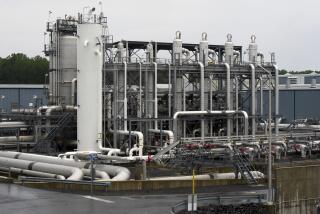U.S. to End Gas Monopoly Held by Pipeline Firms
WASHINGTON â The Federal Energy Regulatory Commission moved Thursday to break up the monopoly held by the nationâs pipeline companies on natural gas supplies and open up competition in the fuel market.
With a current surplus of natural gas forcing drillers to drop their prices, the commissionâs action is expected to result in lower monthly gas bills for the nationâs 45-million families using that fuel to heat their homes with.
Under the FERC plan, expected to take effect starting this fall, the nationâs 25 major interstate pipelines could choose to give up their traditional roles as wholesalers of natural gas and become non-owner transporters or âcarriersâ of the fuel.
Expensive Contracts
In exchange, those pipelines would be allowed to âbuy outâ of expensive long-term contracts that they signed with producers when there were shortages of the fuel in the late 1970s.
Those contracts, obligating pipelines to pay sometimes double and triple the current market price for gas even if they canât resell it, have been blamed for the failure of falling producer prices to reach most residential consumers.
Earlier this year, the Energy Department concluded that residential customers were paying 5% to 10% more for natural gas than they should be, because of âdiscriminatory behaviorâ by the pipelines in passing producer price cuts through to industrial customers only.
Just three weeks ago, a federal appeals court ruled the practice was illegal because residential customers were being denied the same savings.
Under the new regulations, pipelines will pick whether they want to be traditional suppliers or wholesalers of gas or become mere transporters or carriers of the fuel.
But to the extent that they decide to become carriers, they will have to offer that transportation service to all classes of consumers and cannot limit it only to industrial users.
The new proposed regulations, approved Thursday by all five of the commissionâs members, reverse after nearly five decades the way the government has looked at natural gas--a fuel that now provides one-fourth of the nationâs energy.
Monopoly Status
In the past, the government granted pipelines a monopoly status, fixing the rates they could charge and limiting the areas they could serve.
Much in the same way that the government deregulated the airline industry beginning in 1978, FERCâs action will allow pipelines to compete more with one another for customers.
At the same time it will put local retail distributors on a competitive footing with each other in searching out the lowest priced supplies from some 15,000 U.S. producers of natural gas.
More to Read
Sign up for Essential California
The most important California stories and recommendations in your inbox every morning.
You may occasionally receive promotional content from the Los Angeles Times.










